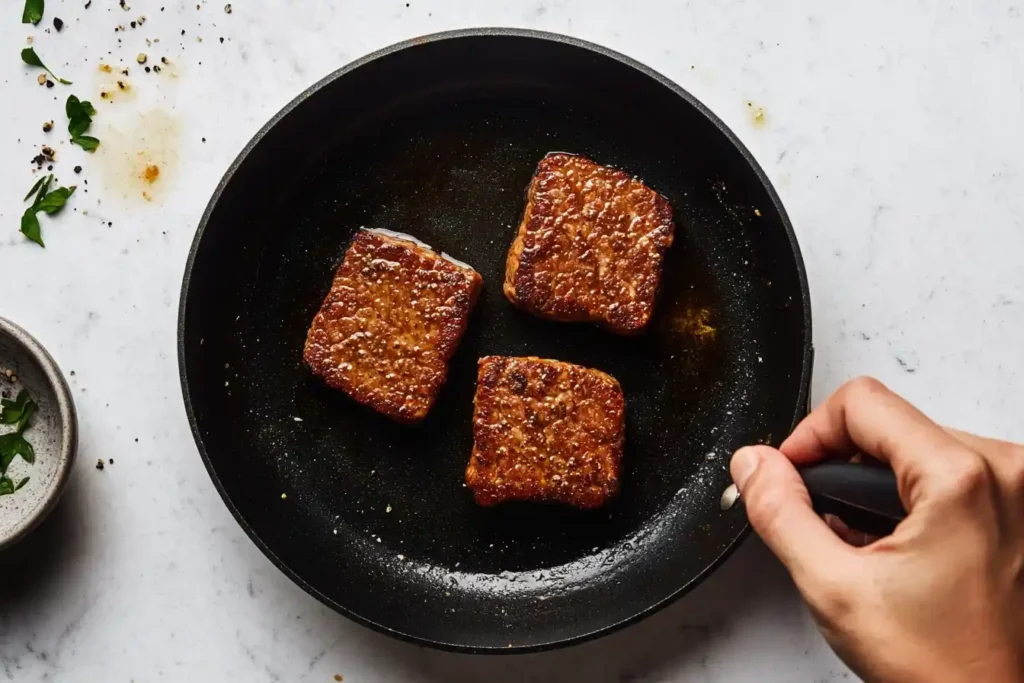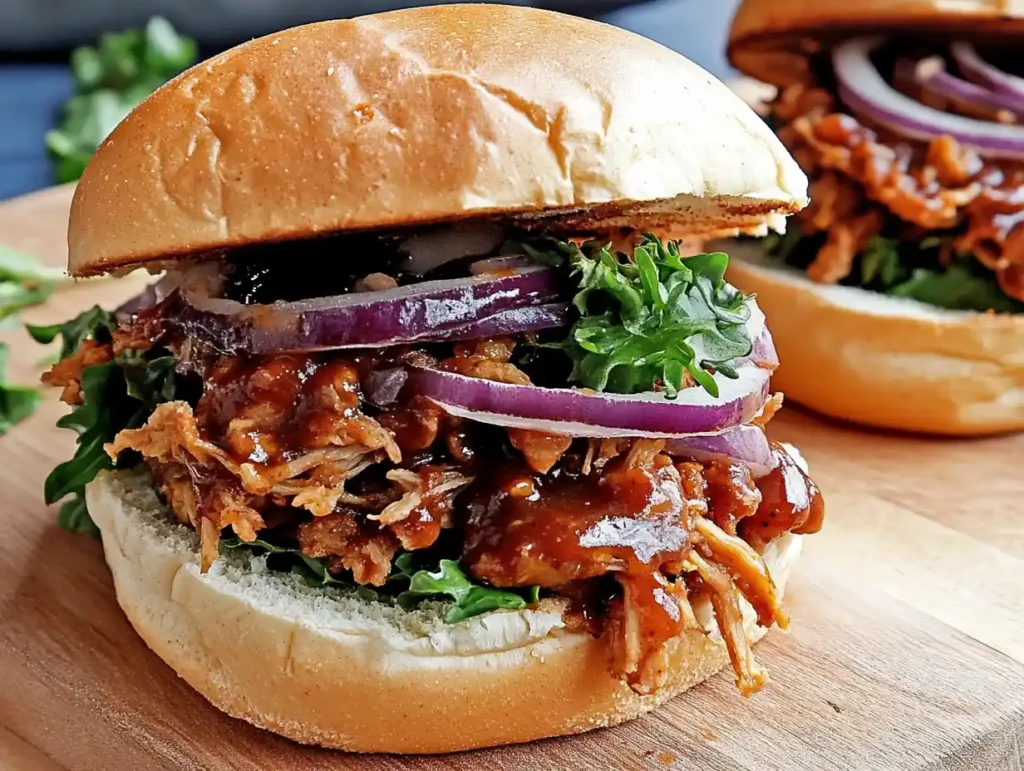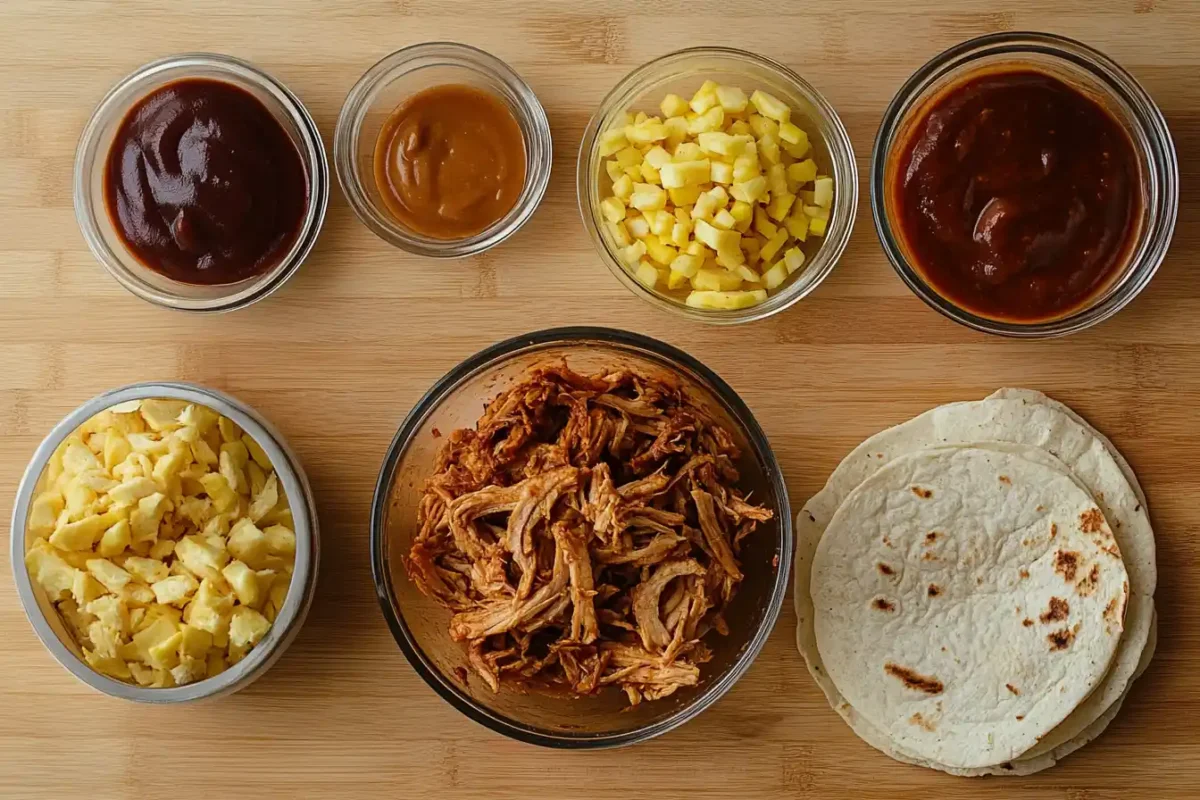In recent years, vegan meat recipes have become increasingly popular, not just among vegans but also among those looking for healthier and more sustainable eating habits. With growing concerns about health, environmental impact, and animal welfare, plant-based meat substitutes have gained significant traction. Whether you are fully vegan, vegetarian, or simply want to reduce your meat intake, vegan meat options can be both delicious and nutritious.
For example, many people are turning to versatile ingredients like seitan and tempeh, which mimic the texture and taste of traditional meat. In fact, vegan meats are now more accessible and flavorful, offering endless culinary possibilities. Learn more about plant-based alternatives from this article on Healthline and discover why this shift towards vegan meat is so crucial.
According to the Good Food Institute, the market for plant-based meat has been growing steadily, driven by consumer demand for better, healthier alternatives. This article will dive into a variety of vegan meat recipes that are easy to prepare at home and perfect for any occasion.
Benefits of Vegan Meat Recipes
Health Benefits of Plant-Based Meats
Vegan meat alternatives provide a range of health benefits, making them an excellent option for those wanting to eat healthier. They are typically lower in saturated fat compared to conventional meat. Furthermore, vegan meats contain no cholesterol and provide essential nutrients such as protein, fiber, vitamins, and minerals.
Low Cholesterol and Saturated Fats
Unlike traditional meat, vegan meat substitutes are free from cholesterol. Cholesterol is one of the leading factors contributing to cardiovascular diseases. Additionally, vegan meats contain less saturated fat, which makes them a heart-healthy option.
High in Plant-Based Protein
Many people worry about getting enough protein when switching to a plant-based diet. Vegan meat products, however, are often rich in protein, thanks to ingredients like soy, seitan, and legumes. Not only do they help meet daily protein needs, but they are also easier for some people to digest compared to animal protein.
Environmental Impact of Vegan Meat
Another compelling reason to choose vegan meat recipes is their lower environmental footprint. Traditional meat production is resource-intensive, consuming significant amounts of water, land, and energy. In contrast, plant-based alternatives produce fewer greenhouse gases and use less water, contributing to environmental sustainability.
For instance, producing one pound of beef requires approximately 1,800 gallons of water. On the other hand, producing the same amount of plant-based protein requires significantly less water and energy. Making this small change in your diet can help contribute to a more sustainable future.
Ethical Considerations
Ethical concerns about animal welfare also drive many people to seek alternatives to conventional meat. By choosing vegan meat recipes, consumers can reduce their contribution to factory farming and animal exploitation. Vegan meat allows individuals to enjoy the flavors and textures of meat without the ethical implications.
Popular Vegan Meat Ingredients
Tofu: A Versatile Plant-Based Protein
Tofu, made from soybeans, is one of the most popular ingredients in vegan meat recipes. It can absorb flavors very well, making it ideal for dishes like stir-fries, curries, and even grilled dishes. Moreover, tofu is rich in protein and calcium, providing valuable nutrients.
Seitan: The Ultimate Meat Substitute
Seitan, often known as “wheat meat,” is made from gluten and has a chewy, meat-like texture. It is perfect for replicating dishes like steak, kebabs, or chicken-style meals. Seitan is high in protein and very versatile, making it a favorite among home cooks.
Tempeh: Fermented Goodness
Tempeh is another excellent source of protein and is made from fermented soybeans. The fermentation process not only makes tempeh easier to digest but also enhances its nutritional value. Tempeh is often used in recipes such as burgers, tacos, and salads.
Jackfruit: A Natural Meat Alternative
Jackfruit has become popular for its unique texture that resembles pulled pork. It is ideal for making sandwiches, tacos, or wraps. Jackfruit itself is not high in protein, but it is excellent for creating vegan versions of dishes that traditionally use shredded meat.
How to Choose the Right Vegan Meat Substitute
Selecting the ideal vegan meat substitute can transform your plant-based cooking experience. With a wide variety of options available, it’s crucial to pick the right substitute that suits your specific dish and preferences. Below are some important aspects to consider when choosing the best vegan meat alternative for your recipes.
Identify the Desired Texture
Texture is a key factor in successfully replacing meat in any dish. If you’re looking for something with a firm, chewy bite similar to chicken or beef, seitan is an ideal choice. For a shredded texture, often seen in pulled pork dishes, jackfruit works wonderfully. The goal is to match the texture of the original meat component to provide an authentic experience, so being mindful of this can help achieve the best results.
Flavor Absorption Capabilities
Different vegan meat alternatives excel in flavor absorption in unique ways. Tofu and tempeh are exceptional at absorbing flavors from marinades, which makes them highly versatile for various types of cuisines. These ingredients act like a blank canvas, allowing you to infuse them with spices and herbs that suit your dish. Meanwhile, seitan has a more savory, umami-like taste that doesn’t need as much seasoning, making it perfect for hearty, meaty recipes.
Nutritional Needs and Benefits
The nutritional content of each vegan meat substitute varies, and understanding these differences will help you meet your dietary goals. For instance, tempeh is a great source of protein, fiber, and probiotics, thanks to its fermentation process, while seitan is high in protein but lacks fiber. Depending on whether you want more protein, fiber, or specific vitamins, choose the substitute that aligns with your health needs.
Best Cooking Techniques
Each vegan meat substitute works best with different cooking techniques. Tofu is excellent for grilling, baking, or frying, which makes it versatile for dishes like kebabs, stir-fries, or even crispy bites. On the other hand, jackfruit is perfect for slow-cooked recipes, allowing the fruit to take on deep, rich flavors. Knowing how to cook each substitute ensures that your final dish is flavorful and has the perfect texture.
Allergies and Food Sensitivities
It’s vital to consider allergies or dietary sensitivities when selecting a vegan meat substitute. For example, seitan is made from wheat gluten, which makes it unsuitable for anyone with gluten sensitivity or celiac disease. In such cases, opt for tofu, tempeh, or legumes like lentils, which offer similar nutritional benefits without the allergens. Being mindful of dietary needs ensures that your dishes are safe and inclusive for everyone to enjoy.
Before choosing a vegan meat substitute, it’s crucial to consider dietary restrictions or allergies. Seitan is made from wheat gluten, which makes it unsuitable for anyone with gluten intolerance or celiac disease. For those avoiding gluten, tofu, tempeh, or legumes like lentils are fantastic alternatives that still provide the desired protein content without causing adverse health reactions. Always keep allergies and specific dietary requirements in mind when selecting plant-based ingredients.
Always consider allergies or food sensitivities when selecting a vegan meat substitute. Seitan, for example, is made from wheat gluten and is not suitable for those with gluten intolerance or celiac disease. In such cases, tofu, tempeh, or lentils are excellent alternatives that provide similar nutritional benefits without triggering gluten-related health issues.
Delicious Vegan Meat Recipes to Try at Home

Vegan Meatballs with Spaghetti
One classic comfort food that can be veganized is spaghetti with meatballs. These vegan meatballs are made from chickpeas, oats, and Italian seasoning, providing a hearty and flavorful experience without any animal products.
Ingredients:
- 1 can chickpeas, drained and rinsed
- 1 cup rolled oats
- 2 tablespoons nutritional yeast
- 2 cloves garlic, minced
- 1 tablespoon Italian seasoning
- Salt and pepper to taste
Instructions
- Preheat your oven to 375°F (190°C).
- In a food processor, blend the chickpeas, oats, nutritional yeast, garlic, Italian seasoning, salt, and pepper until well combined.
- Form the mixture into small balls and place them on a baking sheet lined with parchment paper.
- Bake for 20-25 minutes until golden brown.
- Serve with spaghetti and marinara sauce.
BBQ Pulled Jackfruit Sandwich

If you’re craving a BBQ sandwich, jackfruit is the perfect vegan substitute for pulled pork. Its texture and flavor when cooked with barbecue sauce are absolutely delicious.
Ingredients:
- 1 can young jackfruit, drained
- 1 onion, finely chopped
- 1 cup BBQ sauce
- 1 tablespoon olive oil
- Salt and pepper to taste
Instructions
- Heat olive oil in a skillet over medium heat and sauté the onion until softened.
- Add the drained jackfruit and cook for 5-7 minutes.
- Pour in the BBQ sauce and let simmer for an additional 10 minutes.
- Use a fork to shred the jackfruit into a pulled-pork-like consistency.
- Serve on a bun with coleslaw.
Vegan Seitan Steak
For a hearty meal, try making vegan seitan steak. This recipe replicates the texture and taste of traditional steak, perfect for serving with mashed potatoes and vegetables.
Ingredients:
- 1 cup vital wheat gluten
- 2 tablespoons nutritional yeast
- 1 teaspoon smoked paprika
- 1 teaspoon garlic powder
- 1/2 cup vegetable broth
- 2 tablespoons soy sauce
- 1 tablespoon olive oil
Instructions
- In a mixing bowl, combine the vital wheat gluten, nutritional yeast, smoked paprika, and garlic powder.
- Add the vegetable broth, soy sauce, and olive oil, and mix until a dough forms.
- Knead the dough for 5 minutes, then shape into steaks.
- Steam the steaks for 30 minutes, then pan-fry for a crispy exterior.
Cooking Tips for the Best Vegan Meat Recipes
Seasoning is Key
Seasoning plays a vital role in making vegan meat recipes flavorful. Since plant-based proteins are often neutral in taste, using herbs, spices, and marinades can greatly enhance the dish.
Texture Matters
Achieving the right texture is essential for making vegan meat dishes satisfying. Ingredients like seitan provide a chewy texture, while jackfruit works well for shredded meat recipes. Blending different textures, such as combining beans and grains, can also create a more authentic meat-like experience.
Marinating for Flavor
Marinating vegan meats like tofu, tempeh, or seitan can help infuse them with rich flavors. Allow the vegan meat to marinate for at least 30 minutes or overnight for the best results.
Frequently Asked Questions (FAQs)
What Can You Use for Vegan Meat?
You can use a variety of ingredients for vegan meat, including tofu, seitan, tempeh, jackfruit, lentils, and mushrooms. Each ingredient has a unique texture and flavor profile that works well in different dishes.
Is Vegan Meat Actually Healthy?
Vegan meat can be a healthy alternative to traditional meat, especially when made from whole-food ingredients like legumes, grains, and vegetables. It is typically lower in saturated fats and cholesterol-free. However, it’s important to check the labels, as some store-bought vegan meats can be processed and contain additives.
What Are Vegan Meats Made From?
Vegan meats are made from plant-based ingredients such as soy protein, wheat gluten, legumes, and vegetables. They are designed to replicate the texture and taste of traditional meat while being entirely plant-based.
What is a Vegan that Still Eats Meat?
A person who follows a primarily vegan diet but still consumes meat occasionally is often referred to as a “flexitarian.” Flexitarians aim to reduce their meat intake for health, environmental, or ethical reasons but are not strictly vegan.
Conclusion: Embrace the Variety of Vegan Meat Recipes
Incorporating vegan meat recipes into your diet is a wonderful way to enjoy tasty, diverse, and nutritious meals while making a positive impact on your health, the environment, and animal welfare. The versatility of plant-based ingredients like tofu, seitan, tempeh, and jackfruit ensures that there is something for everyone, whether you prefer comforting classics, bold new flavors, or quick and easy meals. By exploring these recipes, you can create satisfying dishes that are both wholesome and delicious, proving that plant-based eating is anything but boring.
Whether you are fully vegan or just curious about reducing your meat consumption, these recipes will inspire you to cook creatively and embrace a healthier lifestyle. Start experimenting today and discover just how delicious vegan cuisine can be!
Print
BBQ Pulled Jackfruit Sandwich
- Total Time: 30 minutes
- Yield: 4 servings 1x
- Diet: Vegan
Description
This BBQ Pulled Jackfruit Sandwich is the ultimate vegan answer to your barbecue cravings. With a tender, meaty texture and smoky-sweet flavor, it’s a crowd-pleasing plant-based twist on the classic pulled pork sandwich.
Ingredients
1 can young green jackfruit in water or brine, drained and rinsed
1 onion, finely chopped
1 cup BBQ sauce
1 tablespoon olive oil
Salt and pepper to taste
Burger buns, for serving
Coleslaw, for topping (optional)
Instructions
-
Heat olive oil in a skillet over medium heat. Add the chopped onion and sauté until softened, about 5 minutes.
-
Add the drained jackfruit and cook for 5–7 minutes, stirring occasionally.
-
Pour in the BBQ sauce and stir to coat evenly.
-
Reduce heat and simmer for 10 minutes.
-
Use a fork to shred the jackfruit into strands, resembling pulled pork.
-
Serve hot on buns, topped with coleslaw if desired.
Notes
For extra flavor, cook the jackfruit mixture longer to reduce and intensify the sauce. Toast the buns for a nice crunch.
- Prep Time: 10 minutes
- Cook Time: 20 minutes
- Category: Lunch
- Method: Sautéing
- Cuisine: American
Nutrition
- Serving Size: 1 sandwich
- Calories: 360 kcal
- Sugar: 14g
- Sodium: 620mg
- Fat: 10g
- Saturated Fat: 1g
- Unsaturated Fat: 7g
- Trans Fat: 0g
- Carbohydrates: 54g
- Fiber: 5g
- Protein: 6g
- Cholesterol: 0mg
Keywords: vegan sandwich, jackfruit BBQ, meatless BBQ sandwich, easy vegan dinner

